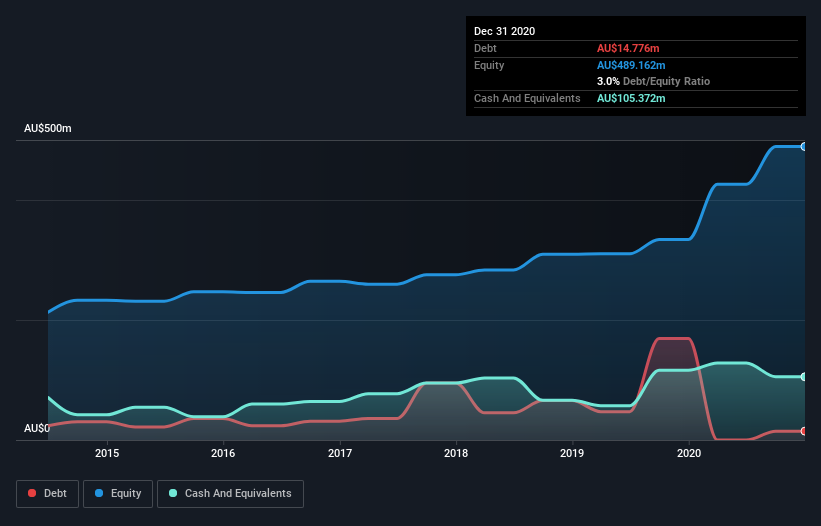Does Breville Group (ASX:BRG) Have A Healthy Balance Sheet?
Warren Buffett famously said, 'Volatility is far from synonymous with risk.' So it might be obvious that you need to consider debt, when you think about how risky any given stock is, because too much debt can sink a company. Importantly, Breville Group Limited (ASX:BRG) does carry debt. But the real question is whether this debt is making the company risky.
What Risk Does Debt Bring?
Debt and other liabilities become risky for a business when it cannot easily fulfill those obligations, either with free cash flow or by raising capital at an attractive price. Ultimately, if the company can't fulfill its legal obligations to repay debt, shareholders could walk away with nothing. However, a more frequent (but still costly) occurrence is where a company must issue shares at bargain-basement prices, permanently diluting shareholders, just to shore up its balance sheet. Of course, the upside of debt is that it often represents cheap capital, especially when it replaces dilution in a company with the ability to reinvest at high rates of return. When we examine debt levels, we first consider both cash and debt levels, together.
Check out our latest analysis for Breville Group
How Much Debt Does Breville Group Carry?
As you can see below, Breville Group had AU$14.8m of debt at December 2020, down from AU$169.0m a year prior. But on the other hand it also has AU$105.4m in cash, leading to a AU$90.6m net cash position.
A Look At Breville Group's Liabilities
The latest balance sheet data shows that Breville Group had liabilities of AU$305.8m due within a year, and liabilities of AU$26.2m falling due after that. Offsetting this, it had AU$105.4m in cash and AU$270.8m in receivables that were due within 12 months. So it actually has AU$44.1m more liquid assets than total liabilities.
Having regard to Breville Group's size, it seems that its liquid assets are well balanced with its total liabilities. So it's very unlikely that the AU$3.72b company is short on cash, but still worth keeping an eye on the balance sheet. Simply put, the fact that Breville Group has more cash than debt is arguably a good indication that it can manage its debt safely.
Another good sign is that Breville Group has been able to increase its EBIT by 23% in twelve months, making it easier to pay down debt. The balance sheet is clearly the area to focus on when you are analysing debt. But it is future earnings, more than anything, that will determine Breville Group's ability to maintain a healthy balance sheet going forward. So if you're focused on the future you can check out this free report showing analyst profit forecasts.
Finally, a business needs free cash flow to pay off debt; accounting profits just don't cut it. While Breville Group has net cash on its balance sheet, it's still worth taking a look at its ability to convert earnings before interest and tax (EBIT) to free cash flow, to help us understand how quickly it is building (or eroding) that cash balance. During the last three years, Breville Group produced sturdy free cash flow equating to 62% of its EBIT, about what we'd expect. This cold hard cash means it can reduce its debt when it wants to.
Summing up
While it is always sensible to investigate a company's debt, in this case Breville Group has AU$90.6m in net cash and a decent-looking balance sheet. And it impressed us with its EBIT growth of 23% over the last year. So is Breville Group's debt a risk? It doesn't seem so to us. There's no doubt that we learn most about debt from the balance sheet. However, not all investment risk resides within the balance sheet - far from it. These risks can be hard to spot. Every company has them, and we've spotted 1 warning sign for Breville Group you should know about.
If you're interested in investing in businesses that can grow profits without the burden of debt, then check out this free list of growing businesses that have net cash on the balance sheet.
This article by Simply Wall St is general in nature. It does not constitute a recommendation to buy or sell any stock, and does not take account of your objectives, or your financial situation. We aim to bring you long-term focused analysis driven by fundamental data. Note that our analysis may not factor in the latest price-sensitive company announcements or qualitative material. Simply Wall St has no position in any stocks mentioned.
Have feedback on this article? Concerned about the content? Get in touch with us directly. Alternatively, email editorial-team (at) simplywallst.com.


